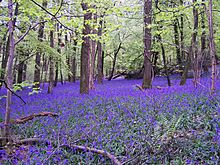Bigsweir Woods facts for kids
| Site of Special Scientific Interest | |

Bluebells in Bigsweir Woods
|
|
| Area of Search | Gloucestershire |
|---|---|
| Coordinates | 51°45′05″N 2°39′30″W / 51.751297°N 2.658343°W |
| Interest | Biological |
| Area | 48.16 hectare |
| Notification | 1984 |
Bigsweir Woods is a beautiful natural area in Gloucestershire, England. It covers about 48 hectares, which is like 70 football fields! This special place is known for its amazing wildlife and plants.
It's officially called a Site of Special Scientific Interest (SSSI). This means it's protected because of its important nature. It was given this special status in 1984. Bigsweir Woods is also part of the stunning Wye Valley Area of Outstanding Natural Beauty (AONB). This area is protected for its beautiful landscapes.
Part of Bigsweir Woods is owned by the Woodland Trust. This charity helps protect and restore woodlands. The wider Wye Valley Woodlands are also a Special Area of Conservation (SAC). This is an even higher level of protection for nature across Europe.
Contents
Discover Bigsweir Woods: A Special Place
Bigsweir Woods is a very important woodland in the United Kingdom. It's considered a "semi-natural" woodland. This means it has grown mostly on its own over a long time. It forms a continuous stretch of forest along the Lower Wye Gorge. This gorge is also a protected SSSI.
The woods are listed as a Key Wildlife Site (KWS) in the local plan for the Forest of Dean. This shows how important it is for local wildlife.
What Makes the Soil Special?
The ground in Bigsweir Woods is made of Devonian Old Red Sandstone. It also has a type of rock called quartz conglomerate. These rocks create a special kind of soil that is quite acidic. This acidic soil helps certain plants and trees to grow really well here.
Trees and Plants You'll Find
Bigsweir Woods is home to many different types of trees. It has some rare and local plant species too. The main tree you'll see is the Sessile Oak. But there are also other trees like Beech, Small-leaved Lime, and Birch.
Understorey Plants
Below the taller trees, you'll find a layer of smaller plants and shrubs. This is called the understorey. Here, you might see Hazel, more Beech trees, and Small-leaved Lime. You can also spot Rowan and Holly.
Ground Flora and Herbs
On the forest floor, there's a rich variety of plants. Common ones include Bramble, Bracken, Ivy, Dog's Mercury, and Bilberry.
You can also find some special local herbs here. These include Forester's Woodrush, Bitter Vetch, Alder Buckthorn, and Wood Fescue. In spring, the woods are famous for their amazing carpets of Bluebells. These beautiful flowers cover the ground in a sea of blue. The site also has many different types of ferns.

